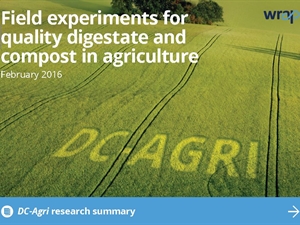News from the Biofertiliser Certification Scheme
The latest news from the Biofertiliser industry
Farmers’ use of renewable fertilisers to be revolutionised by new research
Posted: 9 February, 2016. Written by WRAP press release

Farmers’ and growers’ confidence in digestate and compost has been given a welcome boost, as new ground-breaking research published today, shows smart use of these renewable fertilisers can increase yields and reduce bills with no negative impact on crop quality or safety.
The programme of field experiments, ‘Digestate & Compost in Agriculture’ (DC-Agri), confirms that food-based digestate - a product of anaerobic digestion - is a valuable source of readily available nitrogen; the single most important nutrient influencing crop yields. This new data will enable farmers to predict how much nitrogen the digestate will supply their crops, allowing them to confidently reduce the amount of bagged fertiliser without affecting yields.
For compost – made from recycled green garden waste and food waste – the research shows it builds levels of soil organic matter1 more quickly than other organic materials, such as farmyard manure, which will help deliver stronger and more resilient crops.
In addition, both digestate and compost provide crops with a measured boost of phosphorus, potassium and sulphur, helping to maintain soil fertility. Crops grown with an integrated nutrient plan combining bagged fertilisers and digestate or compost resulted in higher yields and better financial returns.
The five year research programme3, led by resource efficiency charity WRAP, demonstrated that the timing and method of digestate application is critical if the maximum value is to be gained. If digestate is used in the spring on actively growing crops, or other times when there is a crop nitrogen requirement, farmers and growers can significantly increase its nitrogen value. For best results digestate should be applied using precision application methods such as band spreading and shallow injection.
With compost use, the research confirmed that it should be seen as a means to build up long term soil nitrogen rather than a short term replacement4. The value in compost lies in its ability to build soil organic matter more quickly than other organic materials; retention of the organic matter in soils supplied by green compost was almost double that of farmyard manure indicating it’s more resistant to decomposition.
DC-Agri’s robust scientific evidence has now been brought together in WRAP’s guides to good practice, also published today. The guides explain how to use these products safely and help farmers and growers make the most of renewable fertilisers economically and environmentally.
Dr. Richard Swannell, Director at WRAP, said: “Digestate and compost are valuable renewable products of our food and garden waste recycling processes. These new findings show the benefits that using the products correctly can bring, and for the first time farmers and growers have the evidence to make informed decisions about their fertiliser use. This is a significant step forward for both the anaerobic digestion and composting industries and for farmers and growers.”
Defra’s Resources Minister, Rory Stewart, said: “Sustainable farming is increasingly important for our environment and food supply. I welcome this report which will allow farmers to make better decisions about renewable fertilisers, helping to grow crops more smartly and efficiently."
Review the DC-Agri summary and full reports at http://www.wrap.org.uk/dc-agri-reports
Read the good practice guides at http://www.wrap.org.uk/using-renewable-fertilisers
Ends